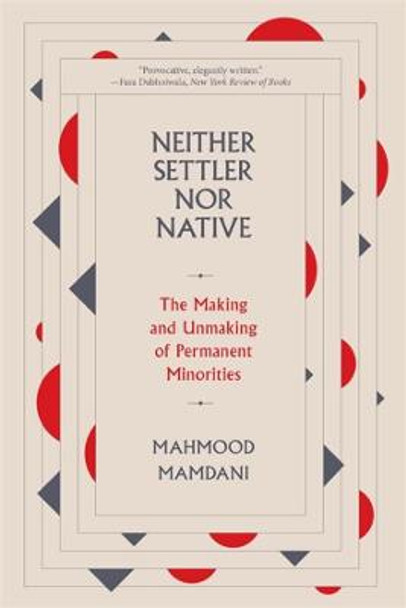Description
Prospect Top 50 Thinker of 2021
British Academy Book Prize Finalist
PROSE Award Finalist
"Provocative, elegantly written."
-Fara Dabhoiwala, New York Review of Books
"Demonstrates how a broad rethinking of political issues becomes possible when Western ideals and practices are examined from the vantage point of Asia and Africa."
-Pankaj Mishra, New York Review of Books
In case after case around the globe-from Israel to Sudan-the colonial state and the nation-state have been constructed through the politicization of a religious or ethnic majority at the expense of an equally manufactured minority. The model emerged in America, where genocide and internment on reservations created a permanent native minority. In Europe, this template would be used both by the Nazis and the Allies.
Neither Settler nor Native offers a vision for arresting this process. Mahmood Mamdani points to inherent limitations in the legal solution attempted at Nuremberg. Political violence demands political solutions: not criminal justice but a rethinking of the political community to include victims and perpetrators, bystanders and beneficiaries. Making the radical argument that the nation-state was born of colonialism, he calls on us to delink the nation from the state so as to ensure equal political rights for all who live within its boundaries.
"A deeply learned account of the origins of our modern world...Mamdani rejects the current focus on human rights as the means to bring justice to the victims of this colonial and postcolonial bloodshed. Instead, he calls for a new kind of political imagination...Joining the ranks of Hannah Arendt's Imperialism, Frantz Fanon's The Wretched of the Earth, and Edward Said's Orientalism, this book is destined to become a classic text of postcolonial studies and political theory."
-Moustafa Bayoumi, author of How Does It Feel to Be a Problem?
"A masterwork of historical comparison and razor-sharp political analysis, with grave lessons about the pitfalls of forgetting, moralizing, or criminalizing this violence. Mamdani also offers a hopeful rejoinder in a revived politics of decolonization."
-Karuna Mantena, Columbia University
"A powerfully original argument, one that supplements political analysis with a map for our political future."
-Faisal Devji, University of Oxford
About the Author
Mahmood Mamdani is Herbert Lehman Professor of Government and Professor of Anthropology and of Middle Eastern, South Asian, and African Studies (MESAAS) at Columbia University and Director of the Makerere Institute of Social Research in Kampala. He is the author of Citizen and Subject, When Victims Become Killers, and Good Muslim, Bad Muslim.
Reviews
Demonstrates how a broad rethinking of political issues becomes possible when Western ideals and practices are examined from the vantage point of Asia and Africa. -- Pankaj Mishra * New York Review of Books *
Argues for a wider, political approach to understanding historical violence rather than an individual, criminal one. Mamdani examines everything from the treatment of Native Americans to Nazism to South African apartheid. It is a complex and at times painful book, but history is often complex and painful, and trying to understand it is one of our few real paths to progress.
-- Candice Millard * New York Times *Over half a century, Mamdani has carved out a reputation as a forceful and articulate critic of political modernity's supposed peace-bringing qualities...Neither Settler nor Native is [his] most comprehensive exploration yet of the subject of majority-minority relations. In a comparative analysis of five countries...he locates the origin story of contemporary postcolonial political violence far back in history. -- Francis Wade * The Baffler *
Mamdani makes a compelling case... Although the book's scope is ambitious...it has a clear starting point: the invention of indirect rule as a technique of modern colonial governance...Mamdani draws on the details of his case studies to formulate some broad lessons for decolonizing politics today-most importantly, disaggregating the nation from the state and creating more inclusive forms of democratic politics in the wake of identity-based strife. -- Hari Ramesh * Boston Review *
Provocative, elegantly written...with the aim of understanding the sources of the extreme violence that has plagued so many postcolonial societies. -- Fara Dabhoiwala * New York Review of Books *
This book compels the reader to rethink the origin and development of the nation-state and its replication as inseparable from European colonialism, beginning with the establishment of the Spanish state through racialized ethnic cleansing and the 1492 deportations of Jews and Moors. In elegant prose with no wasted words or jargon, this original and brilliant work argues that the United States created the template for settler-colonialism, providing the model upon which the South African apartheid regime and the Israeli state were patterned, a model also used by the Nazi regime that adopted US race theory and catastrophic ethnic cleansing. The book provides not only profound historical analysis but also deeply researched descriptions of the current US and Israeli regimes of settler-colonialism and more. -- Roxanne Dunbar-Ortiz, author of An Indigenous Peoples' History of the United States
Brilliant! A deeply learned account of the origins of our modern world. Situating the beginnings of the nation-state in the settler-colonial practice of creating permanent minorities, Mamdani illustrates how this damaging political logic continues into our own era, resulting far too often in today's extraordinary political violence. Through his own elegant contrarianism, Mamdani rejects the current focus on human rights as the means to bring justice to the victims of this colonial and postcolonial bloodshed. Instead, he calls for a new kind of political imagination, one that will pave the way for a truly decolonized future. Joining the ranks of Hannah Arendt's Imperialism, Frantz Fanon's The Wretched of the Earth, and Edward Said's Orientalism, this book is destined to become a classic text of postcolonial studies and political theory. -- Moustafa Bayoumi, Brooklyn College, City University of New York
Neither Settler nor Native analyzes seemingly disparate political histories to illuminate the intertwined logic of colonial statecraft and nation-building, the legacy of which was the violent manufacture of permanent majorities and minorities the world over. This is a masterwork of historical comparison and razor-sharp political analysis, with grave lessons about the pitfalls of forgetting, moralizing, or criminalizing this violence. Mamdani also offers a hopeful rejoinder in a revived politics of decolonization, not as romantic revolution but a renewed art of politics. Decolonization uses the tools of political engagement and negotiation to unsettle inherited identities, to convert perpetrators and victims into survivors, natives and settlers into citizens, nation-states into inclusive democracies. -- Karuna Mantena, Columbia University
A powerfully original argument, one that supplements political analysis with a map for our political future. -- Faisal Devji, University of Oxford
An urgent intervention in contemporary politics. In a searing critique of the nation-state, Mamdani persuasively argues that there will be no decolonization, no democracy, no peace until we de-link the association between the 'nation' and state power. -- Nandita Sharma * The Wire *
Mamdani [is] one of the most perceptive and savviest analysts of postcolonial African history...A major achievement. A veritable testimony to the strength and resources of political thought that is a boon to his students and admirers, and to every other reader not enchanted by the discourses of the powers-that-be. -- S. Parvez Manzoor * Muslim World Book Review *
Awards
Short-listed for PROSE Awards 2021 (United States) and British Academy Book Prize for Global Cultural Understanding 2021 (United States).
Book Information
ISBN 9780674278608
Author Mahmood Mamdani
Format Paperback
Page Count 416
Imprint Harvard University Press
Publisher Harvard University Press








